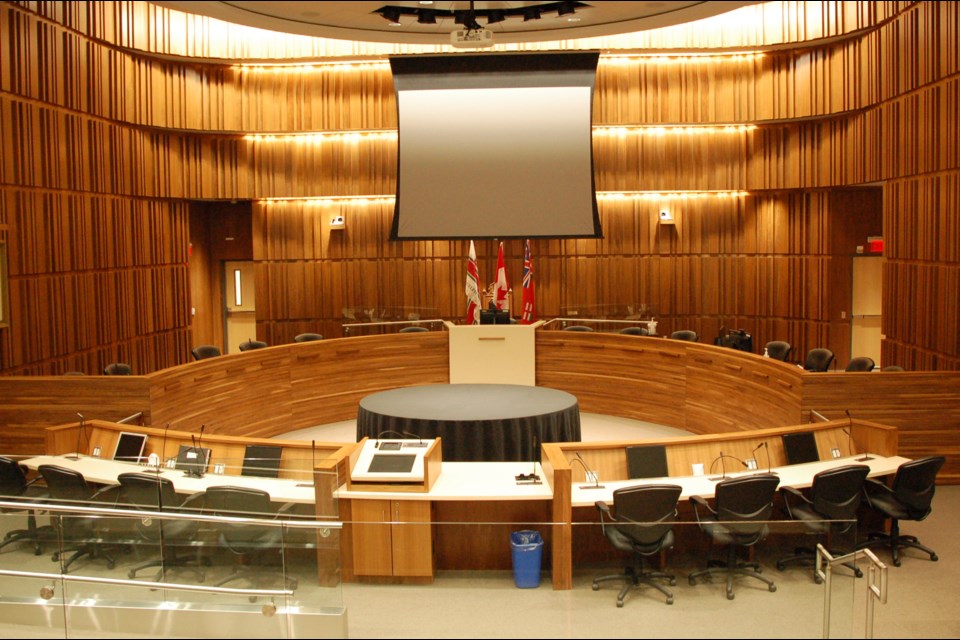Keep the six-ward, 12-councillor system, city council heard repeatedly on Monday evening during a special meeting to discuss a consultant’s recommendation to increase the city to eight wards but drop it to one, full-time councillor per ward.
“The population has decided there should not be a change,” said Hugh Whiteley, noting public support during the consultation process favoured the six-ward options and opinions regarding full versus part-time status were evenly split. “I urge you to maintain your position.”
In a recently released report, a consultant team from Watson & Associations recommends the city move from its current system to one with eight wards, each with a full-time councillor each, in addition to a mayor elected at large.
“It’s difficult for part-time councillors to provide undistracted attention to increasingly complex council business,” said Robert Williams of Watson & Associates in explaining the recommendation. “This could make the position more attractive to a wider range of residents.”
No decision was made Monday evening. The issue was referred to a second special council meeting this week, set for Wednesday evening, during which a formal decision is expected.
Whatever council decides will come into place following next year’s municipal election.
With consideration being given to whether councillors should be full or part-time, a citizens advisory committee is expected to be formed this fall to review the level of remuneration, explained clerk Stephen O’Brien, with a report to council expected mid-next year so that prospective candidates know what the position pays before deciding whether to run.
Remuneration changes would also come into force following the next election.
The consultants team presented four ward boundary options for feedback during the most recent round of public consultation, two of which featured six wards with two part-time councillors each, though the ward boundaries varied.
This, suggested Scott Frederick, essentially “split the vote” in support of a six-ward model, essentially allowing last fall’s initial recommendation of an eight-ward system to stand.
“They’re basically the same thing,” he said of the six-ward options. “It would have overwhelmingly been the most popular.”
During public consultations, the eight-ward system was selected as the first choice by 35 per cent of participants. Coming in second and third were two six-ward options, with 31 and 21 per cent, for a combined 52 per cent support.
“This was not an election, so there was no way to split the vote,” commented consultant John Miller later in the meeting. “We were trying to throw a lasso around peoples’ thinking.”
“It was not intended to confuse people,” said Williams, noting there’s “more than one way” to divide the city into six wards.
Shrinking the number of councillors from 12 to eight supports the “de-democratization” of city council, suggested Ron East of the Guelph chapter of the Council of Canadians, who threw his support behind the six-ward, 12-councillor option.
“I believe that it shrinks the role of the electorate,” he said of the eight-ward model, noting the creation of full-time roles will attract “professional politicians” who are less concerned about the impacts on residents. “Please stay with citizen representation on council.”
Though council is discussing the employment status of councillors, there’s no legislative requirement for the number of hours they work, noted Kevin Bowman, chair of Democracy Guelph.
“You can’t actually dictate full-time or part-time,” he said, explaining it’s up to each individual councillor to decide how many hours to put into the position. “The only people who can decide whether that’s right or wrong are the voters.”
There isn’t enough information available to make an informed decision regarding the employment status of councillors, suggested Whitely, pointing to a lack of details in the consultants’ report.
“We need a lot more information of what the effect of making change before we decide on it,” he said, joining others in challenging the consultants’ presumption full-time positions will lead to greater diversity on council.
In defending that position later in the meeting, consultant David Siegel said there's been “very little” research done on the subject but suggested it’s logical people who want to run for council would be concerned about supporting their families and the need for another job.
Several delegates lamented the provincial government’s 2019 decision to eliminate the option of using a ranked ballot system in municipal elections.
“The number of wasted ballots would drop dramatically,” commented Ken MacKay of Fair Vote Guelph, referring to votes cast in favour of someone who doesn’t win an election. “We anticipate a new government will reinstate ranked ballots.”
In response to a question from Coun. Mark MacKinnon about the potential “customization” of the options, clerk Stephen O’Brien urged caution, noting the consultant’s recommendation stems from months of information review, public consultations and their experiences as experts in the field.
